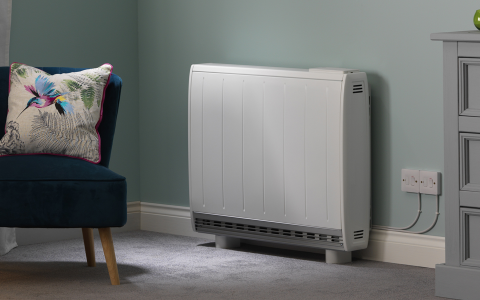
Get up to speed on EcoDesign Lot 20

From January 2018, all local space heaters manufactured for sale in the EU must comply with a minimum efficiency standard under Lot 20 of the Energy Efficiency Directive. It is part of the EU’s commitment to achieving a 20 per cent energy saving by 2020, driving energy efficiency at all stages of the supply chain, from production to final consumption.
A number of ‘product lots’ have already been rolled out as part of the 2012 Energy Efficiency Directive (EED), covering everything from televisions, lightbulbs and washing machines, to machine tools and compressors. Next is Lot 20, focusing on local space heaters – and when you consider that more than half of energy consumed in our homes is used to heat water and space, it is easy to see the difference it could make.
Here is everything you need to know about Lot 20 of the EED (2015/1188).
What is covered?
Lot 20 states that all local space heaters manufactured for sale in the EU after 1st January 2018 which use electricity, gaseous or liquid fuels, must comply with a minimum efficiency standard. This includes electric radiators, electric underfloor heating and electric and gas fires. A second regulation (2015/1185) sets out the same requirement for space heaters which use solid fuels, such as stoves and fireplaces, from 1st January 2022.
How do you define a space heater?
Local room (or space) heating products are defined as appliances that provide heat to indoor spaces by generating heat in the location within which they are situated. Like other product categories, the aim is to rule out inefficient technologies and reduce the energy used in our homes, helping to achieve our overall carbon reduction targets.
Will existing products change?
The key to driving efficiency of local space heaters is in the way in which their operation is regulated using intelligent timers and controls.
Reputable manufacturers, such as Dimplex, have been working hard since the regulation was ratified in 2015 to redesign products to suit the regulation. Most higher specification products from leading manufacturers will usually be within the new regulations – but you may find that some entry-level products now have integral timers or controls to meet the requirements of Lot 20.
How will this help me?
By specifying the latest products, installers can give their customers confidence that they have a better quality product, using smart technologies that can help keep running costs to a minimum.
It is also a great opportunity to re-engage with previous customers, inform them about the legislation and upsell to the latest compliant devices to ensure maximum efficiency (and minimum running costs).
Will it increase costs?
Lot 20 requires that the consumption and emissions for local space heaters must be reduced by applying “existing, non-proprietary technologies” without an increase in the combined costs of purchasing and operating the products.
How exactly do timers and controls help efficiency?
With the recent advancements in the Internet of Things and smart technologies, there is a real opportunity for electric space heaters, in particular, to drive efficiency through intelligent, adaptive controls.
The latest products can include temperature control with presence detection or open window detection, distance control via an app, and even adaptive start control to suit the requirements of the user.
Dimplex’s Q-Rad electric radiator, for example, a heater which is already Lot 20 compliant includes ‘Eco-Start’, a delayed-start anticipatory control – the heater, rather than the user, decides when to turn on to ensure target temperature is achieved at exactly the right user-selected time.
What else do I need to be aware of?
The regulation applies to all products manufactured for sale within the EU before 1st January 2018, even if they were made in a factory outside of the EU. This means that some products manufactured before this date will still be available for sale in 2018, including those kept in the warehouses of wholesalers, distributers and manufacturers. If you’re not sure, the best advice is to stick with a reputable manufacturer that you can trust.
How can I find out more?
Speak to your manufacturer of choice first, which should always be a source of information to make sure you are up to date - not only with its products and technologies, but also with the latest industry trends and developments. You can also register your interest at the new Lot 20 website where further information will be available soon.











